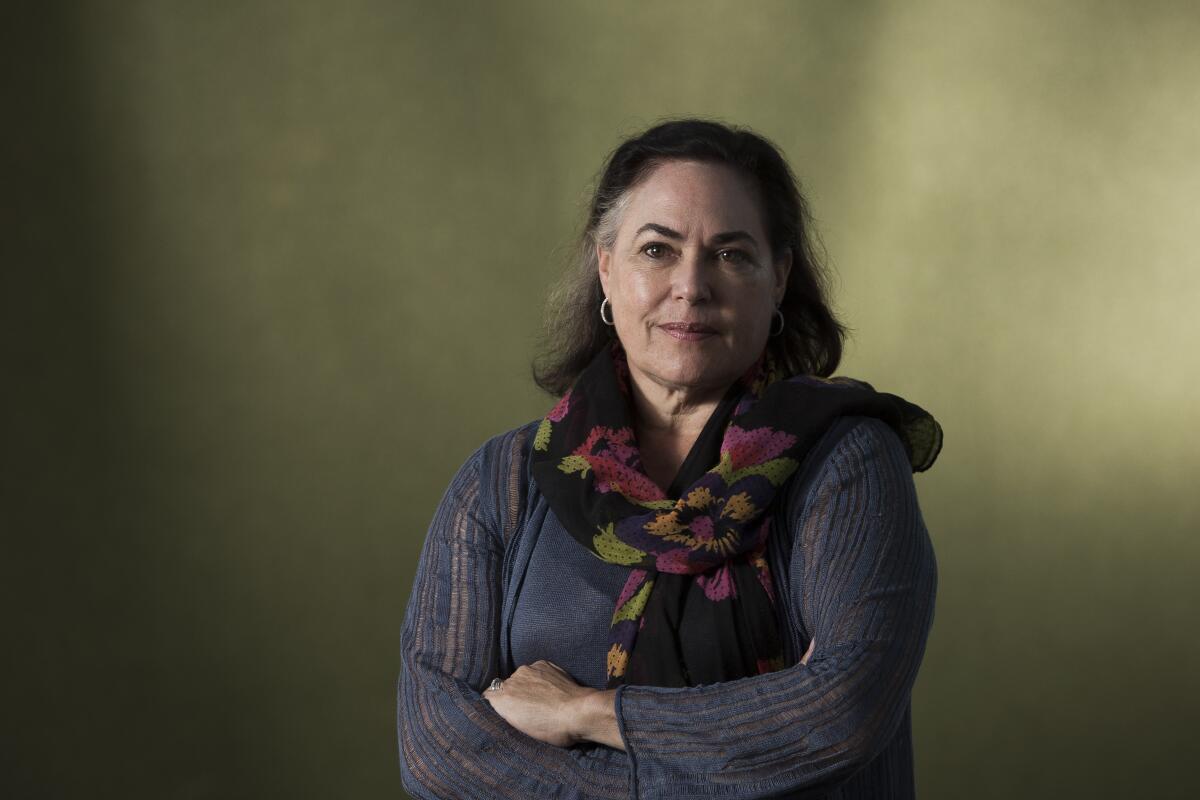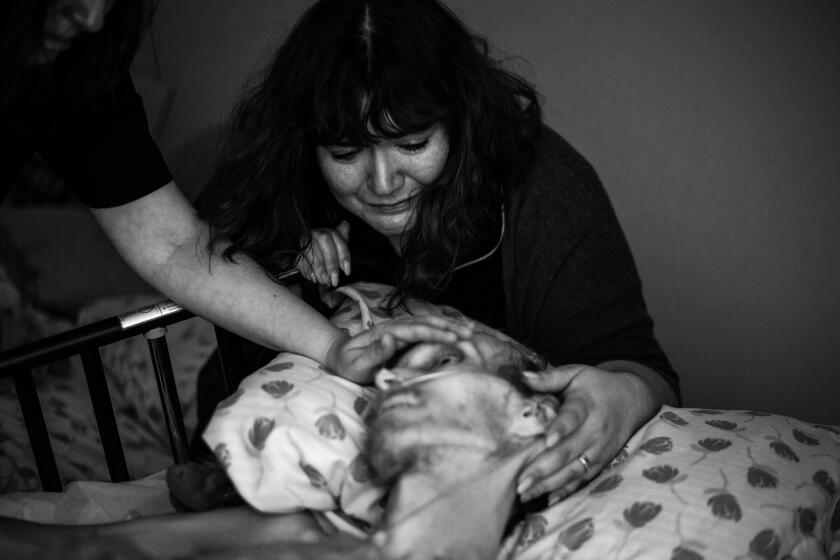He killed himself. She helped him. It should have been easier

- Share via
In her new book, “In Love,” Amy Bloom writes about her husband, Brian Ameche, a gregarious, life-embracing former-college-football-player-turned-architect, and how they fell in love later in life in a small town in Connecticut. And she writes about his Alzheimer’s diagnosis, the early days of his decline, and eventually his death at age 66.
But what distinguishes this book from other such memoirs is that Ameche made a decision within 48 hours of his diagnosis: He did not want to live on indefinitely as the horrendous brain-wasting disease took control and destroyed him. He preferred to die sooner. He wanted to end his life, he said, “while I am still myself, rather than become less and less of a person.”
What he didn’t understand then was just how difficult that is — and that, in the United States, our lives are not entirely our own to do with as we please.
The book tells the terribly moving story of how Bloom and her husband fought to allow him to die on his own terms and made it happen against all obstacles, even as his memory grew scrambled and his decline accelerated. It explains how they searched and searched and found the only solution they could, in Switzerland, and recounts the innumerable setbacks and impediments they faced, including those put up by neurologists and psychiatrists and well-meaning friends and inflexible state laws and reluctant pharmacists, among others.
Opinion Columnist
Nicholas Goldberg
Nicholas Goldberg served 11 years as editor of the editorial page and is a former editor of the Op-Ed page and Sunday Opinion section.
And finally it describes how he got to drink the deadly glass of sodium pentobarbital while holding his wife’s hand in a large, odd immaculate room with many bowls of chocolate in an industrial park outside Zurich.
For me, the story was deeply personal. I’m only a few years younger than Ameche was when he began forgetting things, getting lost, having difficulty reading, repeating himself and suffering from mood swings.
And I’ve witnessed what this vicious disease can do. Both my mother and grandmother died in the late stages of Alzheimer’s after living, in my opinion, substantially longer than they should have.
My grandmother’s situation was particularly tragic and unnecessary. She had told us repeatedly, both before and after her diagnosis, that if she became incompetent and lost the ability to read books or remember family members or tell time or find her way home — much less to speak or feed herself or dress herself or go to the bathroom — she didn’t want to remain alive. She said it for years; she had no doubts.
It will raise a fraught and contentious ethical debate. But dementia sufferers should be able to choose assisted suicide.
Yet for nearly a decade she lay in a nursing home bed in exactly that condition, staring mostly at the wall, and we could find no way to help her until, mercifully, she died.
Since then I have believed that dementia patients should have the right to die if that is their choice.
Over the years, I learned what Bloom and Ameche found out as well: Although there are “death with dignity” laws that make assisted suicide possible in certain cases in the U.S., those laws don’t really apply if you’re suffering from Alzheimer’s.
In California, for instance, the “End of Life Option Act” allows terminally ill people to request drugs from a doctor to end their lives. But they must have six months or less to live, as determined by a doctor. They must be deemed mentally capable and must ask for the drugs twice; they must administer the drugs themselves.
The passage of this law in 2015 was a huge step forward for the right-to-die movement. Though fiercely controversial, it’s been very successful, allowing well over a thousand Californians to end their lives as they chose, presumably with a measure of dignity and less pain and suffering.
The action comes five years after a California law allowed doctors to prescribe lethal doses of drugs to terminally ill people who want to ingest them on their own to end their lives.
But at the end of the day, it only applies to a narrow sliver of people.
“Right to die in America is about as meaningful as the right to eat or the right to decent housing,” Bloom writes. “You’ve got the right, but it doesn’t mean you’re going to get the goods.”
The idea of expanding the law — and I believe it should be expanded — to Alzheimer’s patients and serious dementia sufferers, and perhaps to some other categories of people who are not within six months of death, is fraught and inspires the wrath of opponents, including the Catholic Church. Even the legislators who sponsored the original law in California have been reluctant to expand it. They worry, understandably, about the mental competence of dementia patients to make life-or-death decisions.
Because of course not all dementia patients want to end their lives, nor should they have to. Others are very sure that they do, like my grandmother and Brian Ameche.
A husband reflects on his wife’s death and California’s End of Life Option Act, which allows patients to end their lives with a doctor’s aid. A revision of the law will make it easier to do so.
If the law were to be expanded, there would need to be strong protections to make sure vulnerable people weren’t manipulated or coerced and that they were making their own choices. But surely there are ways that people with an Alzheimer’s diagnosis or who are worried about getting one could, while they’re still mentally capable, lay out their care decisions for the future in an advance directive that makes clear at what point in their decline, if any, they would like drugs administered to end their lives.
We’re given to believe that extending life is always the best option, and that death is to be ducked, deflected and avoided as long as possible. Any other attitude is viewed as morally unacceptable.
But I don’t buy that anymore. As Ameche himself noted, many years before he was diagnosed, there is no life without death. Later he decided that the “long goodbye” was not for him. And he never wavered from that decision.
I admire him for it and I’m pleased for him and his family that he was able to die on his own terms.
More to Read
A cure for the common opinion
Get thought-provoking perspectives with our weekly newsletter.
You may occasionally receive promotional content from the Los Angeles Times.













